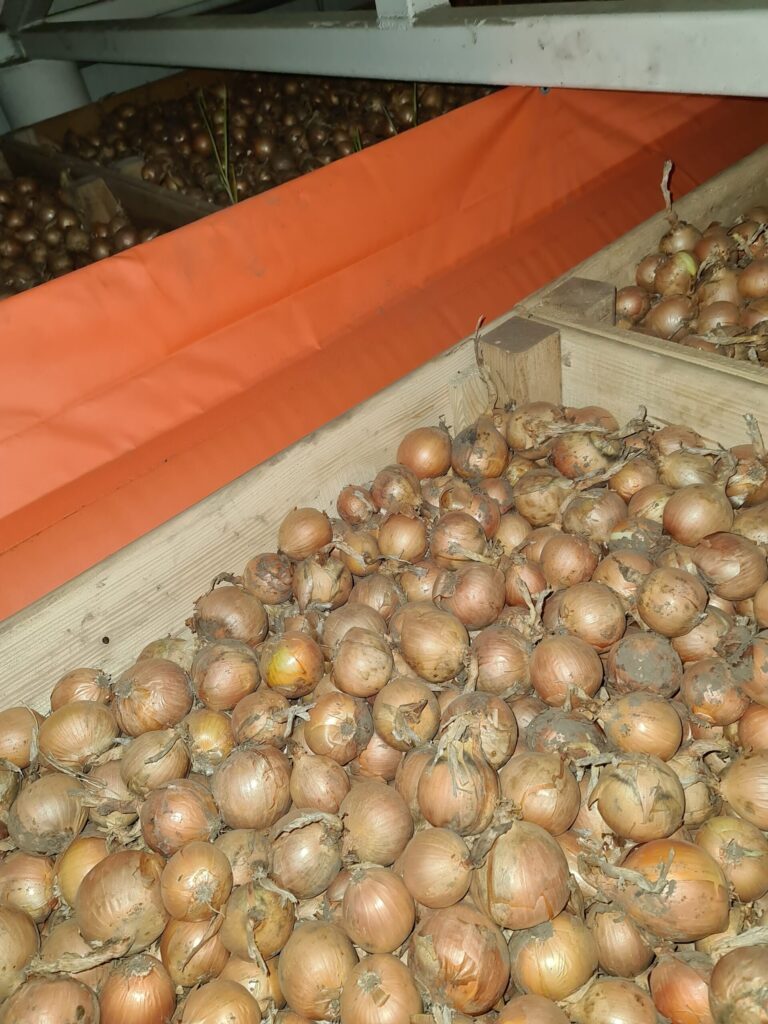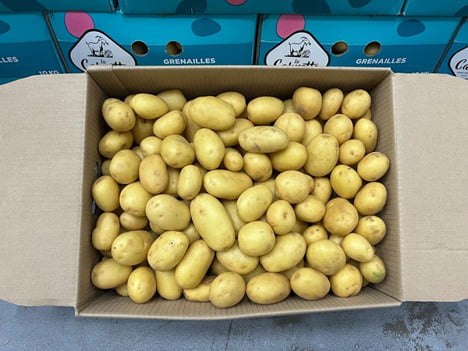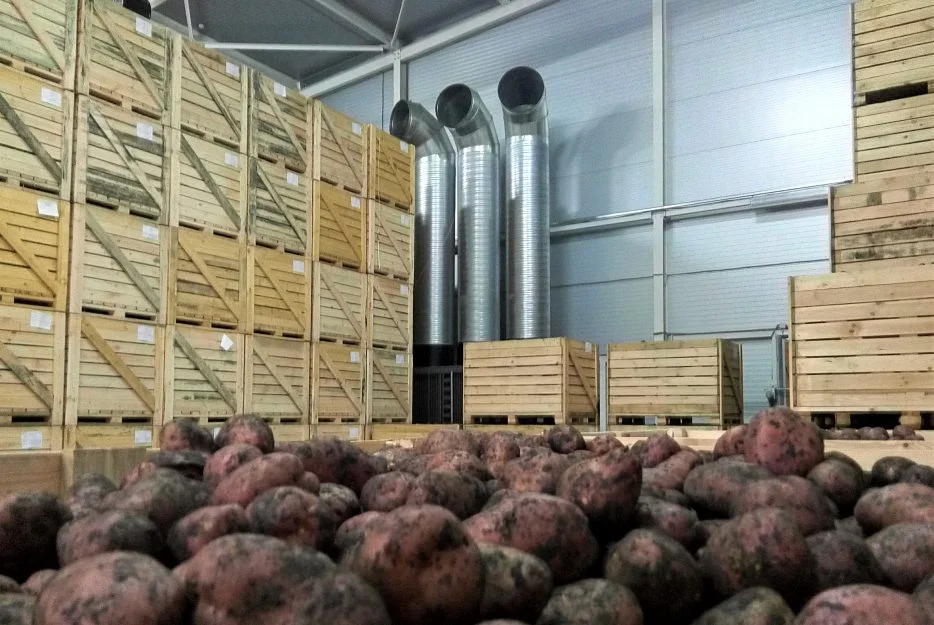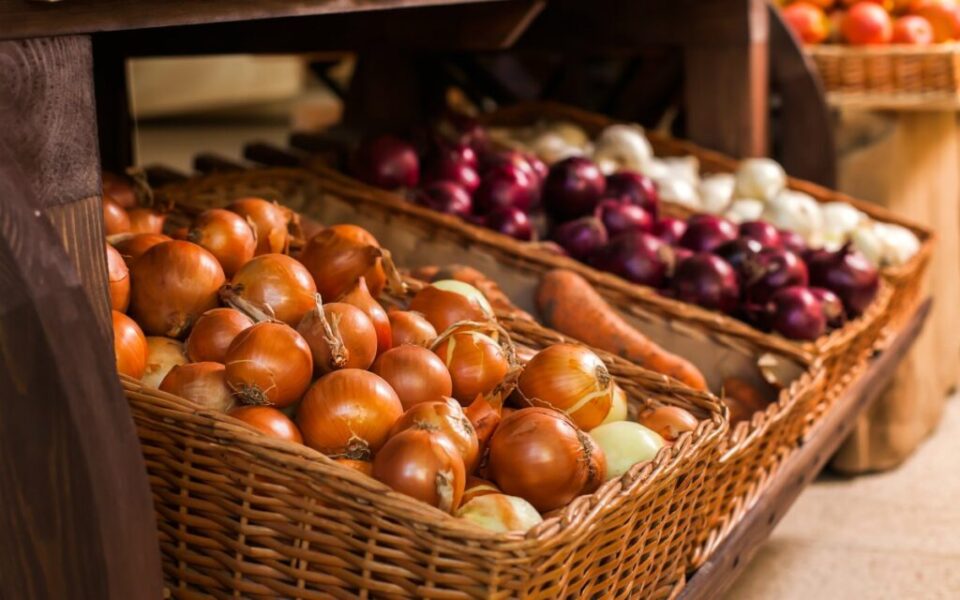Incredible prices for vegetables in Ukraine began to decline rapidly. Some farmers managed to make good money from this, while others decided to make vegetable growing almost the main direction of the economy.
However, long-term and stable income from vegetables cannot be expected if farmers are not ready to invest in the construction of vegetable storage facilities. Andriy Marushchak, commercial director of Van Dijk Technics, spoke about this in an interview with SEEDS.
– Since the beginning of the war, prices for certain vegetables, in particular onions, have been very high in Ukraine. Now the situation has changed radically, vegetables have become cheaper. Did Ukrainian farmers manage the situation and take advantage of it?
– This season has been very indicative for growing vegetables, and now all farmers are beginning to understand this. When an empty space appears on the market, it does not remain empty for long. It is clear that everyone will immediately rush to grow the same, say, onions that were in short supply last year, because only from the farmer they were sold for 40-50 hryvnia ($1,1 – 1,32)
Everyone was quickly imprisoned on a wave of inspiration. Who planted, who sowed, with the expectation of making money. And that’s okay! When a farmer sees a year of very high prices, then vegetables, for example, onions, are a product that is very easy to multiply and produce a lot of it, literally at once.
However, there are also farmers who have already begun to work systematically. They have been working for many years and understand that this season the good price for onions will not be in the fall, but in March, April, and maybe in May.
If a farmer sells the same onion for 10 hryvnia ($0,27) today, in March he could sell it for 25-30 ($0,65). The difference is simply colossal. And this is only for one season!
In addition, it is during the high price season that the equipment will pay for itself in less than one season! Consider for yourself: the cost of equipment for storing vegetables for 1000 tons is approximately 2.7 million UAH. And if you spend this 2.7 million now, then next year you can earn 20 million.

How? Very simple. Everyone who has sowed or planted onions should sell them quickly – they won’t last long without specialized equipment. They sell it inexpensively. Actually, 10 hryvnia today is a normal price at which you can already earn money. But if you calculate in advance, you can earn the same bow both 20 hryvnia and 30.
But you may not earn this money. How? You need to plant or sow onions and not invest in storage equipment. The problem is that next year there will be no such big earnings – there will be a completely different price and a completely different situation. Unless the weather conditions are such that the price will be around 30 hryvnia.
Therefore, I have repeatedly said and will continue to say that it is necessary to invest in the construction of vegetable storage facilities during periods of high prices. Then it’s easier. When you earn, for example, 3 million hryvnia on a thousand tons, it will not be possible to invest all these 3 million hryvnia in storage. This is a big amount. It’s another matter when you earn 20 thousand, it’s easy to pre-invest 3 thousand in the construction of a vegetable storage facility, because it’s a relatively small amount.
Storage is the penultimate link in any vegetable business, but it is no less important than cultivation. It allows you to maintain and maintain the maximum quality of your products and sell them when you need and profitably.
We are back again to what I talk about all the time: during a period of high prices, no one looks at the quality of the same onion, but during a period of low prices, buyers will look closely at the slightest flaws in your product.
– Recently, buyers’ requirements for vegetables have begun to change – they are increasingly buying clean and packaged vegetables.
– This is true. Today, customers, and these include both chains and stores, are more interested in just such a beautiful, presentable product than any bulk potatoes, but cheaper.
Today retail, Ukrainian supermarket chains control the market, and this is very good. At the same time, their requirements for the quality of the product they purchase are increasing. This now applies to both packaged and bulk products. That is, crooked, cracked potatoes are not very interesting, even if they are very cheap.
As for packaging, in my opinion, this is necessity, convenience and presentation of the product. Yes, now we pack in mesh, polyethylene, and so on. However, our British partners say that they only have paper packaging. In the USA, environmental friendliness also prevails.
In my opinion, there should be more and more packaged products. Because a packaged product is a product of large cities, and in Ukraine the share of the urban population already predominates. Such people have no place to grow vegetables, no time to do this, and do not always have storage space – they want to buy vegetables in packaging.
Therefore, packaging of vegetables is the future, and the further we move into the civilized world, the faster we will have to switch to this global trend.
More than one client of our company has realized this. When they started by packing vegetables in 25-30 kg nets, now they are packing them in more compact packaging. And there are gradually more such manufacturers.
Not everyone understands the importance of this aspect of growing vegetables. Whoever understands it faster will earn extra money faster.
With the help of a storage system, a professional storage system, not the kind that is offered by 90% of Ukrainian companies, but a professional one, farmers reduce losses, maintain presentation and maintain the product as much as possible in the quality it was stored in. Then, having a quality product, you can and should think about packaging it correctly.
For what? The price for such vegetables will, of course, be higher. Its appeal will improve, the way it is presented, and it will look completely different on the shelf.

But I must note that there are not many high-quality, professionally grown products in Ukraine. Even existing enterprises involved in washing and packaging vegetables are practically unable to find a quality product at the end of the season.
This is both the issue of growing vegetables and the problem of an insufficient number of professional storage facilities in Ukraine.
It is interesting that we also have few non-professional storage facilities, but the non-professional storage facilities offered by Ukrainian suppliers can no longer ensure good quality of goods at the end of the storage season.
– How do such storage facilities differ from those equipped by Van DaijkTechnics?
– It’s very simple – we sell Dutch technology, which we have been developing for almost 40 years. Dutch companies have long been cooperating with the No. 1 agricultural university in the world, Wageningen University & Research. Together they conducted experiments not only in the Netherlands, but throughout the world.
The experiment was carried out in different climatic zones. Scientists determined what is better, which system prevails, and why such a system, what are the advantages. Of course, this took not a year or two, but more than 20 years.
Thanks to these studies, storage systems, ventilation standards, and cooling standards for various climatic zones were developed. And all this works to this day.
The fact is that Dutch farmers have very small plots of land – up to 36 hectares. For them, the primary task is to grow the highest quality, highest yield product. Even today, the Netherlands is constantly improving storage systems and conducting analytical work.

Recently, I personally dealt with a project implemented by a certain Ukrainian company to store 3000 tons of potatoes. But if you calculate at current prices, the farmers who ordered this storage overpay 15.5 thousand euros annually on electricity alone! All this is due to cheap but low-tech equipment.
Next year the price of electricity will rise and they will pay even more. Considering the period of operation of the equipment, which is 20, sometimes 30 years, one can only imagine what colossal amounts of money the owner of such a storage facility will have to overpay due to the fact that the equipment turned out to be 15% cheaper than high-quality Dutch equipment.




